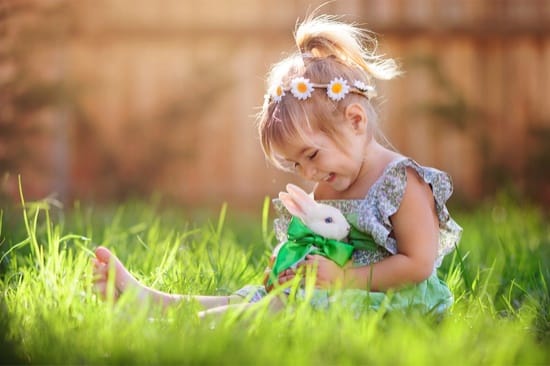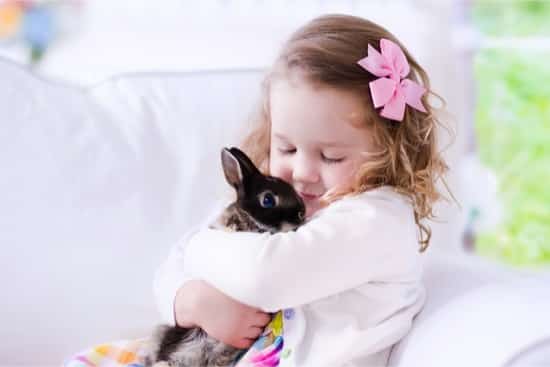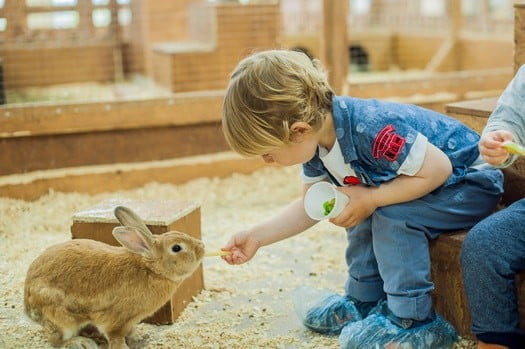Choosing a first pet for a child is fun and exciting. Rabbits are a popular choice, as they’re small and cute. They’re also high maintenance and skittish by nature, though. A rabbit that tolerates kids is not enough. They should actively enjoy a child’s company, and form an unbreakable bond.
Harlequin rabbits are intelligent and endlessly entertaining. Mini Lops are adorable and affectionate, albeit fragile. Dutch rabbits are relaxed, and will bond with even the most anarchic child. Chinchilla and Himalayan rabbits are docile and love human company.
Just because you can find a child-friendly rabbit breed, it doesn’t mean you should. Before committing to a family bunny, ensure that your child is ready for the responsibility. This guide explains if rabbits are suitable pets for children, and how to manage the relationship.
Is a Rabbit a Good Pet for a Child?
Small rabbits are a popular choice as low maintenance pets for kids. Never equate bunnies with hamsters, though. They require very different levels of care and commitment. Here’s our in-depth guide to the pros and cons of rabbits as pets.
Looking after rabbits is a lot of work. Depending on the personality of your child, it may be too much work for them. If you bring a rabbit into your family, it will likely become your pet.
Caring for animals teaches children responsibility. A rabbit should not be an experiment, though. Bunnies are easily stressed by change. If your child loses interest in a bunny and doesn’t meet their needs, they’ll grow unwell.
Rabbits can still make good pets for kids. They have many positive qualities. It’s just critical that you make the decision with your eyes open.
How Do I Know if My Home is Ideal for a Rabbit?
Only adopt a rabbit if you are 100% certain it will be cared for appropriately. Subjecting a rabbit to sub-standard living conditions is cruel. These experts recommend NOT taking on a rabbit if:
- If you have one child aged younger than seven years. Kids of this age tend to be too boisterous and loud to make a bunny comfortable. Naturally, there are exceptions to every rule, though.
- You have multiple children, aged in single figures. You’ll already have your hands full. A bunny will be akin to adding an extra toddler to your family.
- You have a busy home, with teenagers. This will typically create a noisy, hectic house that frightens a rabbit.
On the flipside, consider bringing a rabbit into your family under these criteria:
- You have one calm, gentle child that will handle the rabbit appropriately and accept the responsibility. Ideally, they will be older than 7.
- You have multiple children that fit the above description, and they’re prepared to share the burden of bunny care.
- You have multiple children of varying ages and temperaments. If you have older kids to pick up the slack from the younger, the dynamic may work.
If you’re prepared to take the chance, though, you’ll have an adorable new family member. Just remember that you may be the one that’s left taking care of them.
Advantages of Rabbits as Pets for Kids
There are positives in allowing your child to care for a bunny. These include:
- Pets teach responsibility and empathy. Your child will have to feed and clean them regularly.
- Rabbits are docile and affectionate. Pick the right breed, and they’ll love being petted.
- Rabbits are energetic. They’ll tire your child out, keeping them amused for hours.
- Rabbits live up to a decade. This is much longer than a hamster or fish.
If your rabbit bonds with your child they’ll be inseparable. While a bunny’s love is tough to earn, it’s even harder to lose. Rabbits can be as loyal as dogs if they are treated well.
The energy levels of a rabbit will also match that of a child. Bunnies need to spend around four hours outside their hutch every day. Your child and rabbit can chase each other around the backyard and exhaust each other.
Rabbits are also quiet pets, and can be trained to use a litter tray. You won’t feel as though you’re living in a zoo if you’re not an animal lover.

Disadvantages of Rabbits as Pets for Kids
Sadly, there are more cons than pros in allowing children to care for rabbits:
- Rabbits are skittish. They don’t enjoy loud noises, or chaotic environments. Some children are too boisterous for a bunny to cope with. They’ll bite and kick if they’re afraid.
- Many breeds of rabbit don’t enjoy being held, as they’re delicate. A child’s small hands could drop a bunny. This will spell disaster.
- Rabbits need unbending, inflexible routine. Can your child stick to this, or will after-school clubs and social commitments make it difficult?
- Rabbit hutches must be cleaned at least once a week. Bedding and litter must be changed every other day. If your child forgets, the rabbit will become ill.
- Rabbits can be expensive. A child’s pocket money may cover pellets and toys, but how about insurance and vet’s bills? This must be taken into consideration.
- Rabbits are crepuscular; they’re most active from dawn until mid-morning. They’ll be most energetic while your child is at school. They wake up in at sundown, but remain buoyant after a youngster’s bedtime.
- Rabbits need to be trained to use a litter tray. This can take a week, or longer if they’re stubborn. This may frustrate a child.
You’ll have to think hard before bringing a rabbit into your home. It may be your child’s pet, but it will impact you. If nothing else, a rabbit’s hours of activity will not match those of a young child.
You may end up the pet’s primary caregiver, through no fault of your child. If they can be trusted to clean and feed the bunny, then great. You’ll still need to supervise to ensure everybody’s safety.
You’ll also need to make sure your child understands just how frail a rabbit is. Children cannot treat rabbits as they would dogs or cats. That leads to accidents, traumatized bunnies and expensive trips to the vet.
If your child wants a cuddly pet, there are better options. Some rabbit breeds enjoy handling. Others will at least tolerate it. It’s rarely a bunny’s default mode of affection, though. They like to keep four feet on the ground.
It can’t be stressed enough that rabbits are a long-term commitment. If your child has a questionable attention span, bunnies are not for them. It will end badly for all concerned.
What are the Qualities of a Child-Friendly Rabbit?
If your child is ready to care for a rabbit, consider several factors. The ideal rabbit for a child will need particular characteristics.
- Size and Weight. Make sure your child can safely carry the rabbit, if this is the animal’s wish. Research how big the bunny will be when fully grown. Rabbits don’t stay babies for long.
- Temperament. You’ll need a patient, docile and outgoing bunny if they’ll be spending time with a child. Some rabbit breeds are more affectionate than others.
- Health. Some rabbits are prone to a variety of health conditions. This can lead to numerous trips to the vet, and a worried and upset child. Find a robust breed of bunny.
- Maintenance. A rabbit with longer fur will need to be groomed frequently. Sometimes as often as twice a day. This is a big commitment for a child. A shorthaired breed will typically require less attention.
If you’re adopting from a local shelter, you may not have a choice of breed. This is something to consider carefully.
We always advocate adoption over purchasing. Just ensure that the bunny is a suitable breed for a young person. Also, remember that rehomed rabbits are generally more skittish. This means they’ll need special care.
A rabbit adopted from a shelter will already have been spayed or neutered. This won’t just save you money. The rabbit will also be calmer and less territorial than an unfixed counterpart.
What is the Best Rabbit for Kids?
We have discussed how some rabbits are more child-friendly than others. If you can choose your breed of bunny, the following five affectionate rabbit breeds ideal for children:
- Harlequin Rabbits
- Dutch Rabbits
- Mini Lop Rabbits
- Chinchilla Rabbits
- Himalayan Rabbits
A Harlequin rabbit will become the centerpiece of your family. These bunnies cause no end of delight for children. As the name suggests, they are clown princes of the rabbit world. They’re friendly, and can even be taught tricks.
Dutch rabbits are also a great option. These bunnies love human company, and will actively seek it out. They’re arguably the most gentle and laid-back breed of all, too. A Dutch rabbit will cope with even the most chaotic child.
Mini Lop rabbits make perfect pets for older children. They’re playful, curious, and so cute that it hurts to look at them. They also actively welcome cuddles, once they are used to being handled.
Unfortunately, Mini Lops also fragile. This means that they’re not ideal for young children. A Mini Lop will be seriously hurt if they are dropped. They can also get overexcited, and may bite a boisterous youngster.

Chinchilla rabbits are not chinchillas. They look like them though, thanks to soft, thick gray fur. Chinchilla rabbits are playful, calm and friendly. This breed is never happier than when they’re being petted and showered with affection.
The Himalayan rabbit is another docile and laid-back breed. They’ll tolerate, and possibly even enjoy, being cuddled by a child once they adapt. They enjoy all human company, though, and will always be happy to play.
Introducing a Bunny to a Child
Once you bring your rabbit home, your child will be desperate to meet them. Take a moment to set some ground rules first. Set your rabbit up in their hutch, and explain the following to your child.
- The rabbit will be frightened, and should not be handled immediately. Let the rabbit get used to the child’s smell first.
- The rabbit will be happier if they can make the first move. Sitting on the floor and letting the bunny approach earns their trust.
- The rabbit will enjoy gentle petting on the top of the head, and the cheeks. This will help the bunny consider a child as a source of pleasure.
- Until they are settled, the rabbit will not want to play. That means no running, chasing or loud noises.
If your child is gentle and calm, the bunny will bond with them. Ensure your child understands the importance of patience, though. Pushing a rabbit out of their comfort zone will cause them stress.
Teaching a Child to Safely Handle Rabbits
If you do decide to provide your child with a rabbit, they must learn how to handle them appropriately. The key lessons to teach a child about rabbits:
- A rabbit must never, under any circumstances, be picked up by their ears.
- Tails are delicate, and can easily be pulled off. A rabbit’s tail should not be touched. It certainly shouldn’t be tugged.
- Rabbits don’t like to be touched on the tummy. This part of their anatomy is delicate and easily damaged.
- A rabbit should never be cuddled unless they ask for such attention. Bunnies grow stressed if they are restrained.
- A rabbit must be petted gently and softly. Bunnies cannot be patted like dogs.
If your child follows these instructions, they will forge a strong bond with a bunny. If they don’t, expect conflict to arise.
What Should I Do if My Rabbit Bites My Child?
The first thing to do here is to separate the animal and child. A distressed child may retaliate, and hurt the rabbit. The bunny will likely come out of this altercation worse.
Seek help from somebody else. Both bunny and child will be upset by this turn of events. This means they’ll both need to be comforted. If you can divide and conquer, it will make your life easier.
Return your rabbit to their hutch, and offer them soothing pets. Never reprimand your rabbit for their behavior. They would have bitten because they were frightened, or in pain.
With this in mind, have a calm conversation with your child once you’ve comforted them. Try to find out why the rabbit bit them. It will likely be that they tried to handle the bunny against their wishes.
Explain to your child why the rabbit reacted the way they did. Sometimes, this interaction can be a valuable learning curve. Rabbit bites hurt, but they’re rarely serious.
Is it Safe for Babies to be Around Rabbits?
Rabbits and babies do not always make easy housemates. You’ll have to be vigilant about safety if you have an infant and a free-roaming rabbit.
Consider your rabbit’s safety. Babies and toddlers are inquisitive and clumsy. They could poke a bunny in the eye, or pull off their tail. They may even fall on top of them. This will crush a rabbit’s brittle bones.
Rabbits and babies also both love to chew. This means that their toys will become interchangeable. If your rabbit chews on a baby toy, they will leave their saliva on it. This could contain bacteria, which your baby will potentially ingest.
Bunnies often leave trails of poop in their wake too, even if they’re litter trained. This can cause sickness in young children. A healthy adult can safely handle rabbit feces. Babies and toddlers have weaker immunity.
Here’s another thing to consider; rabbits get jealous. Bunnies are hierarchal. If they don’t feel like they’re the center of attention, they’ll grow cantankerous.
Your rabbit will notice if a baby takes all the focus that used to be on them. If you’re lucky, they’ll sulk about this. A jealous bunny can be aggressive, though. They may bite your baby when your back is turned.
Until your baby is a little older, it’s best to keep your rabbit in their hutch around them. Take your pet outside for some exercise, and some dedicated one-on-one attention.
Popular opinion claims that children should not care for rabbits. Bunnies are too high maintenance, and there is too much risk of a child losing interest. Don’t let this deter you – if you think your child is up to the task.
This cautious approach is recommended. It’s true that rabbits need a lot of care. Only the hardest heart would fail to melt in their presence, though. This may convince your child to take their responsibilities seriously.
All the same, remember that even the most dependable child cannot care for a rabbit alone. They will become a family pet, and you will need to play a role. Thankfully, once you have bonded with the bunny, you’ll be delighted to do so.

